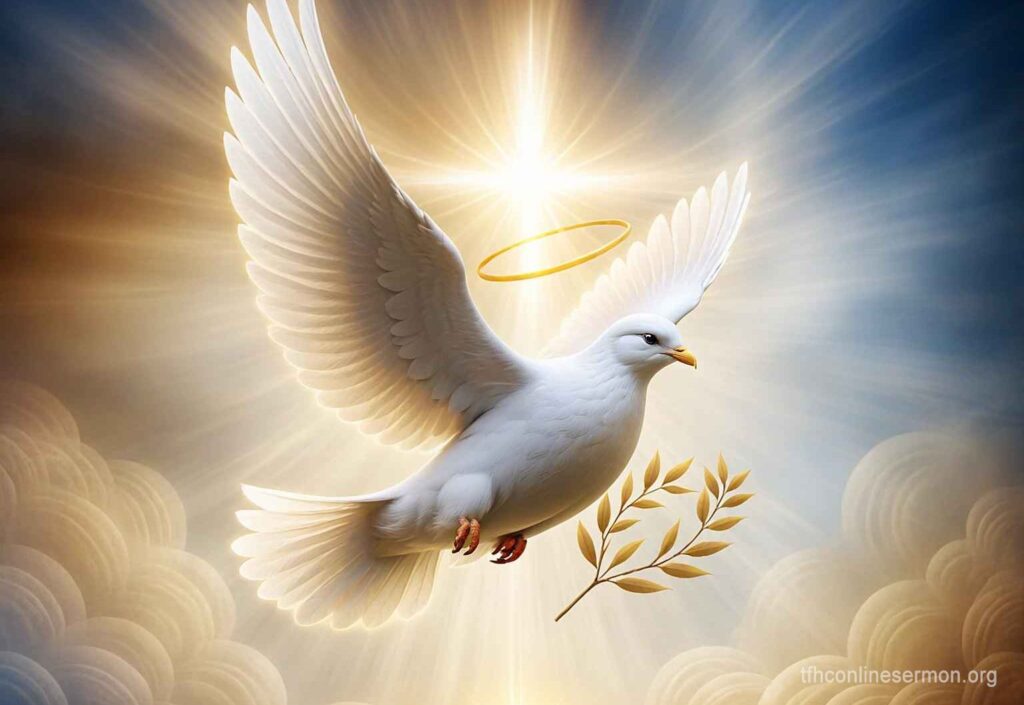
The Bible uses many names of the Holy Spirit, including symbols and biblical numbers when speaking of the Holy Spirit. Each name has to do with a particular office of the Holy Spirit.
By examining the names and symbols of the Holy Spirit and what they mean, we learn about the characteristics and traits of the Holy Spirit and the relationship between the Spirit and us.
Introduction: names of the Holy Spirit (The Holy Ghost)
Firstly, the Holy Spirit (sometimes translated as the Holy Ghost) emphasizes the essential moral character of the Spirit. He is Holy in Himself.
He therefore impacts holiness to others. It appears seven times as the Holy Spirit and 90 times as the Holy Ghost in the King James Version of the Bible.
The Holy Spirit is the power that brings holiness and purity to believers. “v7 For God hath not called us unto uncleanness, but unto holiness. v8 He therefore that despiseth, despiseth not man, but God, who hath also given unto us his holy Spirit.” (1 Thes. 4:7, 8)
“If ye then, being evil, know how to give good gifts unto your children; how much more shall your heavenly Father give the Holy Spirit to them that ask Him?” Luke 11:13
The following are important names of the Holy spirit:
The Spirit Of Truth
This appears four times in the King James Version of the Bible. John 14:17, 15:26, 16:13, 1 John 4:6. “Even the Spirit of truth; whom the world cannot receive, because it seeth him not, neither knoweth him, but ye know him, for he dewelleth with you, and shall be in you” John 14:17.
He is called the Spirit of Truth because it is impossible for Him to lie or be in error. His ministry has its foundation squarely on the truth of God’s word since He is its Author.
All scripture is given by inspiration of God and is profitable for doctrine, for reproof, for correction for instruction in righteousness. 2 Timothy 3:16. He will not lead or direct contrary to what the scriptures teach and say. This is why the Bible is known as “The sword of the Spirit” (Ephesians 6: 17)
The Spirit Of God
The Holy Spirit is called the Spirit of God because God works through the Holy Spirit: “And the Spirit of God moved upon the face of the waters” – Gen 1: 2
“And grieve not the Holy Spirit of God, whereby we are sealed unto the day of redemption” Eph 4: 30
The phrase "Spirit of God" appears 26 times in the King James Version.
The Spirit Of Christ
This name brings out the relation of the Spirit to Christ as well as to the Father. It appears only 2 times in the Bible (King James). Romans 8: 9 and 1 Peter 1: 11
“Now if any man have not the Spirit of Christ, he is none of his” Romans 8: 9 The Holy Spirit is called the Spirit of Christ because Jesus shed upon believers Him who He had received of the Father (Acts 2: 33)
The Comforter
People also call the Holy Spirit the Comforter, a name that reflects His endless mercy.. It means that someone calls us to their side or that someone is always ready to stand by us and take our part.
The Paracletor or Comforter gives solace and stands by the side of anyone in difficulty. He counsels, pleads, entreats, exhorts, and strengthens so that a person can gain victory over his opponents.
“And I will pray the father and he shall give you another comforter, that he may abide with you forever” John 14 : 16
The word comforter appears 8 times in King James version of the Bible but only 4 times it describes the Holy spirit (John 14:16, 26, 15: 26, 16 : 7).
Other Notable Names Of The Holy Spirit include:
1. Spirit of life: Rom 8: 2, Rev. 11: 11
2. Spirit of Grace: Zec 12:10, Heb 10:29
3. Spirit of Knowledge: Isaiah 11:2
4. Spirit of Glory: 1 Peter 4:14
5. Eternal Spirit: Heb 9:14
6. Spirit of the Father: Math 10:20
7. Spirit of Prophecy: Rev. 19:10
8. Good Spirit: Neh. 9:20
It is also important to mention the diffreent symbols of the Holy Spirit in the Bible. Below are some of them:
Symbols Of The Holy Spirit
The Bible uses various symbols to represent the Holy Spirit.
Thus, the purpose of using symbols is to shed more light, add understanding, and illustrate the truth.
When one object has several symbols that represent it, each symbol emphasizes a different aspect of the object.
Water
“In the last day, that great day of the feast, Jesus stood and cried, saying, if any man thirst, let him come unto me and drink.
He that believeth on me, as the scripture hath said, out of his belly shall flow rivers of living water” John 7:37 – 38.
(a) Water is indispensable for human life and existence, so also the Holy Spirit is important to our spiritual life.
(b) Sin makes us dirty, therefore Holy Spirit cleanses our spiritual lives just as water cleanses our bodies.
Wind
Jesus compares the Spirit’s work to the wind in his conversation with Nicodemus in John chapter three. “The wind bloweth where it listeth and thou hearest the sound thereof, but canst not tell whence it cometh, and whither it goeth; so is everyone that is born of the Spirit” John 3:8
The importance of this metaphor in explaining the Holy Spirit includes:
(a) Just as wind exists everywhere, the Holy Spirit is everywhere. Nobody can monopolize or resist the Holy Spirit.
(b) The wind is air in continuous motion, so the Holy Spirit is also working continually.
(c) No one can control the direction of the wind, so the Holy Spirit has the supreme will and works according to his own purpose.
Fire
The Holy Spirit came at Pentecost, not only like the wind but also as tongues of fire resting on the heads of each believer in the upper room (Acts 2:3). John the Baptist spoke about Christ, who would baptize with the Holy Spirit and fire. “He shall baptize you with the Holy Ghost and with fire” (Mathew 3:11)
(a) In many instances in the Old Testament, the presence of God appeared in fire. e.g. Moses met with God at the burning bush that was not consumed (Exodus 3:1 – 5)
(b) Fire burns away unwanted things. The Spirit convicts of sin; he burns the rubbish of sin to make us more like Christ.
(c) Fire illuminates and provides us with light, and this enlarges the sphere and hours of our activity.
The Holy Spirit by shedding His divine light of heaven helps us realize eternal life and see the secret of heaven.
(d) Fire symbolizes the Holy Spirit because it gives us supernatural zeal.
(e) Lastly, fire symbolizes power, therefore the Holy Spirit provides us with the power of heaven to preach the gospel and live a life of faith.
Oil
In the Old Testament, prophets, priests, and kings were anointed with oil when they took up public duties.
“Then Samuel took the horn of oil and anointed him in the midst of his brethren, and the spirit of the Lord came upon David from that day forward” I Sam 16:13
So, the significance of this symbol includes:
(a) Anointed places and persons are holy, set apart unto God.
(b) Oil was necessary to light the seven candlesticks in the Tabernacle of God. Therefore, only the light from the oil of the Holy Spirit can illuminate the word of God.
(c) Oil prevents wear and tear and breakdown by relieving the friction between moving parts. The lubricating oil of peace, love, and healing comes only when we are filled with the Holy Spirit.
(d) Thus, oil is a necessary ingredient for the preservation of life.
Dove
“And Jesus, when he was baptized, went up straightway out of the water; and lo, the heavens were opened unto him and he saw the spirit of God descending like a dove, and lighting upon him” Mathew 3:16 In fact, all the four gospels described the Holy Spirit descending like a dove on Christ at his baptism.
The importance of the dove as a symbol of the Holy Spirit includes:
(a) The dove is known as a symbol of peace. In Gen. 8:10 – 11, the first evidence to show that peace had returned on the earth and that the Judgment and wrath of God had passed away was a dove.
(b) The dove is also a symbol of meekness and humility. A person with the Holy Spirit must have a humble and meek spirit,
(c) The dove is often described as a pure and harmless creature. The Holy Spirit has not come to bite, tear, and kill but to save, heal, and build up.
Other Holy Spirit symbols’ meanings are:
1. Seal (Eph. 1:13)
2. Wine (Eph 5:18)
3. Guarantee (2Cor. 1:21 – 22)
Conclusion: names of the Holy Spirit
In conclusion, the names and symbols of the Holy Spirit reveal His multifaceted nature and divine role in the life of every believer. From the comforting presence of the Dove to the purifying power of Fire, each name and symbol offers a deeper understanding of how the Holy Spirit guides, empowers, and transforms us.
So, embracing these truths helps us walk more closely with God and live out our faith with greater purpose and power.
Names Of The Holy Spirit Quiz
- Names Of The Holy Spirit - October 4, 2009



